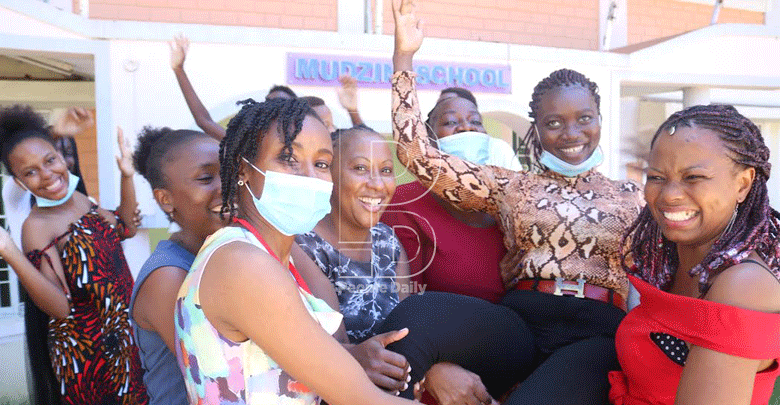How school survived last-minute curriculum change to excel in KCPE
By Reuben Mwambingu, May 3, 2021
Reuben Mwambingu @reubenmwambingu
In the balmy Kikambala area of Kilifi county, about 30 kilometres North East of Mombasa town lies Mudzini School, a high end learning institution, which offers three curriculums including the old 8-4-4 system, the new Competency-Based Curriculum and the Cambridge international curriculum.
Beyond the unmistaken stylish structures that usher you into the elite setup and serene environment of the posh school, is an emotional tale of a mixture of tears, of sorrow and joy that is written across the faces of the teachers, students and parents, as they narrate a journey of struggle.
This year, the school, which started operations in 2017 had its first batch of candidates who sat for Kenya Certificate of Primary Education (KCPE) exam.
Mudzini School fraternity recalls how a last-minute switching of candidates from the British based Cambridge curricula to the 8-4-4 system, nearly plunged the institution into a miasma of ridicule.
As late as 2019, 11 out of 16 candidates who sat KCPE this year at the school were sitting for their Checkpoint exams in Class Seven under the Cambridge system.
But shortly afterwards, they would switch to the 8-4-4 system and began preparing for the KCPE, a move teachers at the school say proved challenging.
“You can imagine, some of the candidates were learning detailed Kiswahili language for the first time in their lives yet they were candidates preparing to be examined in just a few months to come.

They encountered a lot of struggles, because at the start of their eighth year, they were performing extremely poorly and we could see that they were so discouraged,” explains the school’s section head in charge of academics and examination affairs Julius Kassim.
According to Kassim, the decision to switch the candidates was made by parents and the school had no option, but to cooperate.
The situation would further be compounded by Covid-19 pandemic, which struck in March last year as preparation for exams were at the peak.
“Before the pandemic, we had only three students scoring 300 marks out of the posible 500 and the rest were scoring as low as between 154 and 293 marks.
We had a lot of work to guide the students and motivate them,” Kassim reckons.
Teachers, parents and learners waited with bated breath as Education Cabinet Secretary George Magoha, released the results two weeks ago.
And shortly afterwards resounding jubilation and ululation would rent the school as it became certain that the results were way above average, the challenges notwithstanding.
The school according to Kassim posted a mean score of 347.69, with one candidate scoring above 400 marks, 13 of them between 300 and 399 marks while two scored between 200 and 299 marks.
The top candidate Sharon Kazungu 15, who joined the school from Mudzini Kwetu Trust Foundation Home, a residential care facility for girls aged five to 21 years who have experienced life challenges, including neglect says she never expected the 406 score.
“Based on what we have been through I never expected such results. We were introduced to a new system and then Covid-19 came.
We thought we couldn’t make it. But first we thank God and the teachers really encouraged us,” she says.
Another Candidate Ndela Mwiri 14, who is also a popular upcoming actress in the county says she never liked her parents idea of switching to a new system.
“We were told that the 8-4-4 system will harden us on grounds that it is tougher than the Cambridge system.
I did not like the idea. In fact I almost gave up, but the teachers were very supportive,” she says.
Hilda Washe, a parent whose son Isaac Juba scored 379 says at the beginning she was extremely demoralised by her son’s performance at the school.
“I transferred my son from another school to this school, but when he sat his first exam he scored very poorly, but the teachers asked us to be patient,” she recounts.
Pam Pendo 14, scored 394 marks. She recalls her struggles with Kiswahili. “Teachers had to take us back all the way to Class Four work. It was really tough,” says Pendo.
Godwin Odongo, their Kiswahili teacher recalls how the class appeared demoralised.
“I taught them Kiswahili and they would ask questions in English. However, we maneuvered the waters and they succeeded,” Odongo says.
Conducted virtual classes
Kassim says they initiated virtual classes when the pandemic struck, something he says was made possible by the schools robust ICT systems backed by digitally equipped teachers.
“It was hard work with a lot of resilience from that time onwards. We had several assessments and with time, began to realise that the class was improving.
In fact at some point, we produced a mean score of 347 and this is what we believe has been reflected in the KCPE results,” he says.
Molding learners to fit under 8-4-4 system within a short time, Kassim says, was an uphill task, because the approach of the two systems is different. “In the 8-4-4 curriculum, topics taught from Grade Four to Grade Eight are the same.
However, in every step the topics go deeper. But in the Cambridge system, they only go deep at Year 10 and 11…again remember, under Cambridge, there are no multiple choices in answering questions, pupils are taught to express themselves.
We had difficulties here, because you will find the pupil saying they are thinking of an answer, which is not among the choices,” he says.
At the same time, he says a question from 8-4-4 at Class Eight level requires something thought deeply whereas students from the Cambridge system are not able to go that deep.